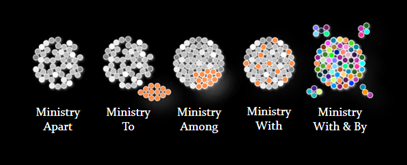Kate Strater teaches special education at Calvin University in Grand Rapids, Michigan. She also directs Calvin’s Life and Career Studies program, which offers postsecondary certificates for young adults with intellectual disability. She is passionate about developing and implementing inclusive postsecondary education and employment opportunities for individuals with intellectual or developmental disabilities. In this edited conversation, Kate Strater discusses how inclusive postsecondary education helps young adults with intellectual disability flourish through employment and independent living.
Is intellectual disability (ID) the same as developmental disability?
They are not the same. Approximately 1 to 3 percent of the U.S. general population has an intellectual disability (ID), which means that, before age 22, a person manifests certain limitations in cognitive skills and adaptive functioning. Historically, ID was divided into mild, moderate, severe, and profound categories. This used to be determined through IQ tests, but we no longer make determinations solely on test scores. Instead, we consider intellectual functioning across conceptual, social, and practical abilities and the supports that people with ID need.
Developmental disability refers to a group of chronic conditions that limit a child’s physical, learning, language, or behavior functions. Intellectual disability is the most common developmental disability, but developmental disability does not always include ID. You can have autism or cerebral palsy, both developmental disabilities, without having ID.
What difficulties do young adults with ID face?
People with ID face many barriers to employment and independent living. These include a lack of adequate transition services beyond high school; attitudes and stigma; ableism; access to transportation; finding social community; access to medical care; and inadequate supports planning and implementation.
A 2013 survey commissioned by Special Olympics showed that unemployment among people with intellectual disability (21 percent) is more than twice as high as in the general population (8 percent). Furthermore, only 44 percent of adults with ID ages 21–64 are in the labor force, compared to 83 percent of working-age adults without disabilities. The 2018 Family and Individual Needs for Disability Supports (FINDS) survey showed that 80 percent of adults with intellectual and developmental disability live with a caregiver who is a family member.
This sounds bleak. Can schools and churches help improve outcomes?
These outcomes are bleak, but inclusive postsecondary education has been shown to greatly improve employment and independent living outcomes for young adults with ID. In 2020–2021, immediately after COVID-related shutdowns, students with ID who had graduated from a TPSID program (a federally funded inclusive higher education program) were employed at a rate of 49 percent compared to the 12 percent of other adults with ID who were being served by state agencies. Furthermore, 67 percent of TPSID graduates had paid employment three years after leaving their college, and 54 percent of TPSID graduates reported that they were not living with their family.
Churches, schools, and social services have more power to change the status quo when working together than any person or agency can achieve on their own. I would argue that we must create more opportunities for people with ID to enhance their independence and employment prospects through higher education. We must put the individual with ID at the center, empowered toward self-determination. Churches, schools, and social services can come alongside with hospitality, care, community, services, and supports.
What might schools learn from churches about including people with ID?
Schools can learn about community development from churches. Care groups, Bible studies, youth groups, prayer groups—any groups—are intentional communities developed for people to become known and loved; grow together; support, challenge, and care for one another; and respond to one another’s needs with understanding and hospitality.
This visual is one provided by Erik Carter, executive director of the Baylor Center for Developmental Disabilities. I think it gives some insight into what it means to build intentional communities. When group membership is reciprocal, we aim toward this idea of ministry with and by.

What do you enjoy about your work with young adults with ID?
Interviewing students in job internships and inclusive college is a joy. I am humbled and grateful to every student who visits, applies, and chooses to spend their time with us. Over years of working alongside people with intellectual disability, I have learned to listen better and get out of the way. It is difficult to truly hear when institutions, agencies, and parents have agendas; figuring out how to listen to the individual has been a great area of growth and a blessing.
Do families ever get in the way of self-determined choices that a young adult with ID might seek?
Sometimes a young person wants to work in a certain field or seeks a certain experience. The family has walked alongside their child ever since diagnosis and has seen how the child has been excluded. Sometimes family members argue against independence, higher education, and employment for many reasons, safety concerns, and fear that their child might be hurt or rejected often rising to the top. We talk together about what has been positive so far and what might be possible.
Before coming to teach special education at Calvin University, I headed up a site, which offers job internships where young adults with ID work alongside everyone else. I remember a Project Search student with autism and ID. His family didn’t think he could work. But he had a really specific strength as a warehouse picker. He used a headset to learn what to pick from bins and then put them in a specific order on a conveyor belt. After an internship, the warehouse hired him as a picker.
How might a college or university education benefit young adults with ID—and schools that choose inclusion?
In 2023, the Institute for Inclusive Education posted a brief video, “Think Higher. Think College.” (4:03). The video explains that there are more than 420,000 school-aged children with intellectual disability in the United States. Only 2 percent of them will have the opportunity to attend college. There are currently 338 colleges and universities that offer inclusive postsecondary education, a mere 5.6 percent of the colleges and universities in the US. In the video, students with ID talk about getting serious about studying, working for pay, joining extracurricular activities, and living “a fun dorm life like the other kids.”
Meanwhile, professors and administrators in the video explain that including these students creates a more caring environment. It also pushes leaders to pay more attention to universal access and universal design for learning, which benefits everyone.
What does Calvin University’s Life and Career Studies (LCS) program provide to make inclusion work?
LCS students take specialized courses that address practical skills like financial literacy, employment readiness, relationships, and independent living. They choose electives along with traditional degree-seeking students. Volunteer peer partners learn side by side with LCS students to explain classwork when necessary and support completing homework assignments on time. Students of all kinds enjoy dorm life, dining, college chapel, on-campus employment, and extracurricular activities such as choir, dance guild, and volunteering together.
We work hard at Calvin to implement best practices for employment and independent-living support. Person-centered planning is at the heart of our work. Once an individual has discovered and shared their vision for life, employment, living, and community, we walk alongside them to find opportunities for learning and practice. For example, we require that LCS students do seven semesters of internship. Paid employment during school is the greatest predictor of paid employment after school. This gives students the opportunity to explore interests, practice soft skills, learn a variety of jobs, and transfer what they learned to new places of employment.
What can professors do to make their courses easier to understand for students with ID?
Kevin Timpe is a Calvin philosophy professor and a disability advocate. I have observed him add cognitive supports to his lectures. He often starts by articulating a plain-language outline of what will be addressed during the lecture and pairs that with a visual outline on a screen. It takes under two minutes to do! The first time I saw this, I thought, "Why have I not been doing this?" Creating a map that will be followed increases perceptibility.
Can you give a plain-language summary example?
I’ll give two examples of how plain-language summaries can benefit everyone, not just those with ID. First, for difficult concepts in education, I often use three slides to present the topic. They include a visual representation of the concept, a full written description of the concepts, and a plain-language description of the concept. Some students love to generate visual representations of some of our coursework, and others don't like it—human variability in practice! Second, for a 2024 research article in Journal of Inclusive Postsecondary Education, a plain-language summary is required.
What’s an example of how LCS students share their gifts with others?
Our goal is to intentionally make room for invitation, community, being together, and belonging. This is far different from a helper-helpee model. One example of intentional and reciprocal ministry comes from Jane Standal, a class of 2027 LCS student who is studying education. As a first-year student, she decided that building community in her residence hall was important to her. She began “Treat Tuesday,” where she invited people to stop by her dorm room on Tuesdays for a treat. Little did she know that she would still be doing this in the last week of the school year because it became a fixture of the community.
Jane emailed me, “Treat Tuesday started when I came to Calvin just as a way to meet some people on my floor, but I had no idea it would continue all school year 😀. And I had no idea people from other floors and the boy's side of the dorm would start coming too, which was so fun.”
Learn More
Read Kate Strater’s academic journal articles. Learn more about Calvin University’s four-year Life and Career Studies program and how LCS has evolved. Find other inclusive college programs, including Christian ones. Watch Institute for Inclusive Education’s brief video “Think Higher. Think College.” (4:03). Read Disability and Inclusive Communities by Kevin Timpe.

